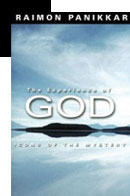

sito ufficiale


The Experience of God
Icons of the Mystery
Only the second part of the title was used in the first edition of this work [Madrid 1994, ed. incomplete], and although this was unchanged in the Italian (Brescia 1998) and French (Paris 2002) editions, the German (Freiburg 2000) bore the amplified title Das Göttliche in Allem: Der Kern spiritueller Erfahrung. We are facing one of the most significant and mature theological works of Raimon Panikkar where he expresses what he understands by the experience of God and the favored paths to have this experience.
The experience of God, in as much as it is experience of the divine, is for Panikkar an experience “not only possible, but also necessary in order that all human beings might become aware of their proper identity.” Because “human beings are fully human if they have the experience of the divine; if not, they have not yet come to integrate themselves in the human.” This experience of God, however, cannot be “monopolized by any religion, by any culture, or by any system of thought.”
The experience of God “is not an experience of anything, nor an experience of anyone; it is not a special experience nor a specialized one: it is pure experience, it is precisely the contingency of being with, of living with, because I am not, I cannot be an isolated being.” Therefore, it is “experience in depth of each and every human experience … the deepest root of all experience” and thus “without the bonds that unite us with all of Reality I cannot have the experience of God.” It is the experience of “contingency”: cum tangere, touching the tangent, the recognition of the limits themselves, where one perceives that there is something “more,” “beyond, something that rises above, that escapes from the limits themselves, and that transcends all limitation.
In this respect, it is necessary to distinguish between faith, act of faith and belief, the set of beliefs that articulate a religion.
In all, there are favored places for this experience of God that Panikkar ends by elaborating in nine points: love, thou, happiness, suffering, evil, forgiveness, crucial moments of life, nature and silence. The Christian experience of Go is characterized by the encounter with Christ and the Trinity, through the experience of Jesus of Nazareth.
The book ends with an expressive chapter on speaking about God, in another set of nine extremely suggestive sutras: Speaking that assumes interior silence and purity of heart. “Sui generis” speech. Speech from all of our being. Speech that is not confined to any Church, religion or belief. But necessarily mediated by some belief. Speech about a symbol, not about a concept. Polysemic speech. God is not the only symbol of the divine. Speech that necessarily returns to a new silence.
translation from Spanish
